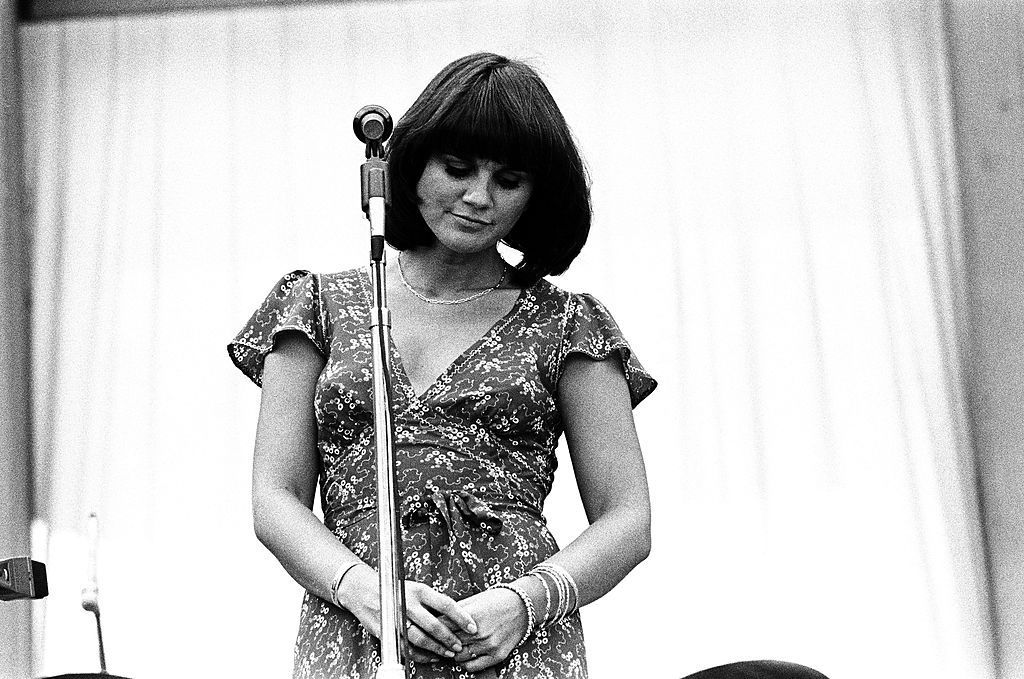
“Hey Mister, That’s Me Up on the Jukebox” is Linda Ronstadt singing from inside the record itself—where heartbreak isn’t just remembered, it’s replayed on command, one more dime at a time.
Let’s put the essential facts up front, because they illuminate why this “deep cut” carries such a lived-in glow. “Hey Mister, That’s Me Up on the Jukebox” appears as track 2 on Linda Ronstadt’s 1975 album Prisoner in Disguise, released September 15, 1975, produced by Peter Asher. The track runs about 4:07–4:09 depending on the listing—long enough to settle into its mood, short enough to feel like a late-night confession that ends before you can interrupt it. And because you asked for launch rankings: this song was not issued as a charting single, so it has no debut position on the Hot 100. Its “public footprint” lives through the album that carried it—Prisoner in Disguise peaked at No. 4 on the Billboard 200.
Now, the story behind the song’s voice begins with another great voice. James Taylor wrote “Hey Mister, That’s Me Up on the Jukebox”, and he first released it on his 1971 album Mud Slide Slim and the Blue Horizon (released in April 1971). In other words, Ronstadt wasn’t borrowing from a faceless catalog—she was reaching toward a songwriter whose work already felt like spoken truth set to music, the kind of truth you could lean on without it breaking. Officially, Taylor is credited as the songwriter.
So why does Ronstadt’s version feel so special—so intimate, even when it’s coming through speakers and not from across a kitchen table? Because the song is meta in the most human way: the narrator is literally the voice on the jukebox, pleading with the person feeding it coins. It’s a song about being trapped in a loop—of longing, of performance, of a sadness that gets “requested” again and again by someone who may not realize the singer is bleeding each time the needle drops. The central image—“that’s me up on the jukebox”—turns the jukebox into something more than a machine. It becomes a little altar where people go to worship their own memories, sometimes without mercy for the ones who made the music in the first place.
Placed on Prisoner in Disguise, that idea carries an extra, quietly poignant echo. By 1975, Linda Ronstadt was no longer a rising talent trying to be noticed—she was a major figure, coming off her breakthrough era and shaping albums with a curator’s ear for songs by friends and admired writers. Wikipedia’s album history notes how she chose material from songwriter circles that included James Taylor and others in that community. The irony is gentle but real: a superstar sings a song about being reduced to “the sad one” on a jukebox—about being chosen for your sorrow and replayed for someone else’s catharsis.
Musically, her reading stretches the feeling. Taylor’s original has that dry, conversational ease—like someone shrugging while admitting something serious. Ronstadt, by contrast, brings a more cinematic ache. Her voice doesn’t simply tell the story; it inhabits it. She makes the jukebox narrator feel less like a clever idea and more like a person—tired, homesick, and strangely dignified. When she sings lines about being “headed home,” you don’t hear a punchline. You hear the small bravery of wanting something simple: a return, a door, a quiet room where nobody asks you to be “on.” (And that, perhaps, is the most grown-up sadness of all—not the drama of loss, but the exhaustion of always having to sing through it.)
There’s also a tenderness in Ronstadt’s choice to place this song right after “Love Is a Rose” on the album. It’s like she invites you in with a quick bloom—then immediately turns the light down and says, Now let me show you what’s underneath the pretty. That sequencing is part of the artistry: the record behaves like a night out that starts bright and ends honest.
In the end, “Hey Mister, That’s Me Up on the Jukebox” isn’t famous the way Ronstadt’s biggest singles are famous—and maybe it’s better that way. It feels like a track you find, rather than one the world insists you already know. And once you find it, you recognize the old truth it carries: sometimes we keep replaying the saddest song not because we enjoy the pain, but because the pain proves the love was real. Ronstadt sings that truth with a kind of steady compassion—toward the listener, toward the lover at the jukebox, and toward the voice trapped inside the machine. And when the song ends, it leaves you with a lingering hush, as if the room itself is waiting to see whether someone will drop in one more coin—or finally let the singer go home.